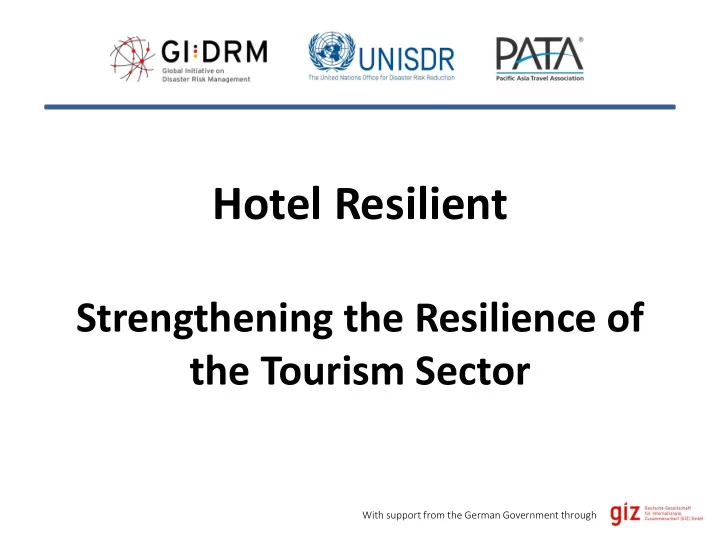

Hotel Resilient Strengthening the Resilience of the Tourism Sector With support from the German Government through
Why Tourism Matters Source: UNWTO Tourism Highlights 2014
Trends and Forecast Source: UNWTO Tourism Highlights 2014
Tourism and Disasters • Economic losses from disasters are now reaching an average of US$250 - US$300 billion each year • Partnerships with the private sector, which is responsible for 70% to 85% of all investments worldwide, and small and medium-sized enterprises are important • Many popular tourism destinations are highly exposed to natural hazards • Tourism development can create new risk but also presents great opportunities for risk management solutions
Hurricane, Tsunami, Storm Surge and Earthquake Risk in Indonesia Source: UNWTO Tourism Highlights 2014 Source: OCHA 2011
Seismic, Volcanic and Tropical Storm Risk in The Philippines Ground Shaking Hazard Map Bohol, The Philippines Source: Provincial Government of Bohol 2014 Source: OCHA 2007
Typhoon Haiyan - Houses Damaged in The Philippines International Tourist Arrivals Decline (%) between 2004-05 Source: PATA Source: OCHA 2013
Hazardous Leisure • Tourism is one of the mos ost t se severely ly exp xposed se sectors (GAR 2013) location of many destinations in hazard prone areas unfamiliarity of tourist with environment and hazards hotel industry is often unable to address and manage natural hazards emphasis on disaster response rather than reducing risks
Hazardous Leisure Bali Maldives Sri Lanka Thailand 0,00 -5,00 -10,00 -15,00 -20,00 -25,00 -30,00 -35,00 INTERNATIONAL TOURIST ARRIVALS DECLINE (%) Annual Change 2005/2004 -40,00
Hotel Resilient Obje bjectiv ive: To improve disaster risk management and strengthen resilience in the tourism industry. Appr pproach: Strong partnerships with the pub publi lic and and priv private se sector in the field of tourism and disaster risk management. Develop instruments to red educe bus busin iness ris risk an and the the ris risk of of tour ouris ists, work orkers, an and surr surroundin ing com ommunit itie ies to o na natural an and tec echnologic ical ha hazards. Tailored components for lar arger hot hotels an and SMEs Es according to their requirements and capacities.
Hotel Resilient Curr urrent t Foc ocus Cou ountr trie ies: Indonesia, Maldives, Myanmar, Philippines and Thailand Indonesia Maldives Myanmar The Philippines Thailand Out utcomes: • Market Study ‚ Developing strategies to strengthen the resilience of hotels to disasters’ • Raising awareness and promoting the Hotel Resilient Initiative (Tourism / DRM Events and Conferences) • Develop risk management standards and pilot in up to three selected destinations
Market Study - Methodology • Semi-structured interviews with 17 representatives of government agencies, hotel industry, hotel and tourism associations, tour operators, and insurance companies in Indonesia, the Maldives, the Philippines, and Thailand. • Key areas included: Hotel risk management strategies Benefits and barriers to adoption of standards Marketability of risk management Needs of the tourism sector
Market Study - Findings Hot otel l Ris Risk Man anagement Str trategie ies Independent hotels rely on their experience to develop risk management strategies Chain hotels tend to have standards and audited systems in risk management There are some legislated requirements for risk management in hotels Ben enefit its an and Barr arrie iers to o Ado doptio ion of of Stan andards The development of standards for disaster resilience is supported by many in the industry for consistency and to guide best practice Barriers: cost, time, capacity, structures
Market Study - Findings Mark arketabil ility of of Ris Risk Man anagement Insurers do reduce premiums due to effective risk management practices Tour operators / travel agencies and those booking conferences or corporate retreats request information on risk assessments and management Disaster risks are not a significant factor in tourism destination and hotel selection, but awareness of the risks is growing Nee eeds of of the the Tour ouris ism Sec ector Information sharing and partnerships are important Diverse needs in destinations (standards, trainings, certification, …)
Market Study - Recommendations 1. 6. Develop international Engage global insurers and recognised standards industry associations 2. 7. Work with hotel industry Create local partnerships leaders among stakeholders 3. 8. Reflect relevant legislation Consider the needs of the industry 4. Promote both legislative and 9. market forces Consider certification in phase two of the Initiative 5. Focus on business to business marketing of the Initiative
Thank you very much for your attention! For fu further in information ple lease contact: Ha Hanna Maie ier (GIDRM/G /GIZ) E-mail: hanna.maier@giz.de Bri Brigitte Leo Leoni (UNISDR) E-mail: leonib@un.org Paul l Prua ruangkarn (PATA) E-mail: paul@pata.org With support from the German Government through
Recommend
More recommend